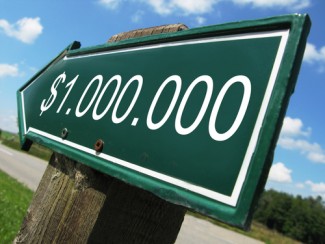Lawyer's million-dollar challenge wasn't an enforceable contract, 11th Circuit says

Image from Shutterstock.
A Florida lawyer who issued a million-dollar challenge on national TV is not obligated to pay the money to the law student who sought to collect, a federal appeals court has ruled.
The Atlanta-based 11th U.S. Circuit Court of Appeals ruled on behalf of the lawyer, James Cheney Mason, the Southern District of Florida Blog reports. In a Dec. 18 decision (PDF), the court said the challenge did not give rise to an enforceable unilateral contract.
The exaggerated offer of a million dollars indicates it was hyperbole, the appeals court said. Mason’s challenge was designed to illustrate what he saw as serious holes in the prosecution’s case against his client.
“We could just as easily substitute a comparable idiom such as ‘I’ll eat my hat’ or ‘I’ll be a monkey’s uncle’ into Mason’s interview in the place of ‘I’ll pay them a million dollars,’ and the outcome would be the same,” the court said. “We would not be inclined to make him either consume his headwear or assume a simian relationship were he to be proven wrong; nor will we make him pay one million dollars here.”
In the interview at issue, Mason told NBC that his quadruple murder client could not have committed the crimes because he had an alibi—he was on a business trip in Georgia on the day of the Florida slayings, a fact confirmed by hotel surveillance video several hours before and after the murders. Prosecutors, however, contended the defendant used an alias to fly to Florida, committed the murders, flew back to Atlanta under a different alias, and returned to the hotel 28 minutes after the flight landed.
In the interview, recorded before trial and broadcast after his client’s 2006 conviction, Mason said the prosecution’s theory was impossible. “I challenge anybody to show me—I’ll pay them a million dollars if they can do it,” he said in the edited interview. “Twenty-eight minutes, can’t happen. Didn’t happen.”
South Texas College of Law student San Dustin Kolodziej accepted the challenge, taking the flight in December 2007 and returning to the hotel site within 28 minutes. He sent Mason a letter seeking to collect the money. Kolodziej sued when Mason refused to pay.
The district court said an unedited version of Mason’s interview showed the challenge was directed at the prosecution. Because the edited version did not contain Mason’s true offer, there was no mutual assent, the district court found in a ruling for Mason.
The 11th Circuit affirmed the grant of summary judgment, but relied on different grounds. “We do not find that Mason’s statements were such that a reasonable, objective person would have understood them to be an invitation to contract, regardless of whether we look to the unedited interview or the edited television broadcast seen by Kolodziej,” the 11th Circuit said.



